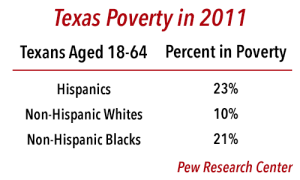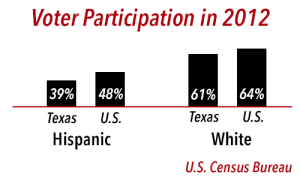It was 2004. A woman fried food on the stove, speaking to her nephew rapidly in Spanish about the election.
“You have to vote for Bush because we can’t have people depending on welfare,” she said. “Everyone has to work hard to succeed here.”
Her nephew is SMU senior and Forth Worth native Mario Monterroso.
“Hispanic culture and Catholicism are so ingrained that many are very conservative,” Monterroso said.
The Hispanic population in Texas, currently at almost 40 percent of the population, is increasing. This bloc will likely become an important and vital aspect of Texas politics. The general alignment of the Hispanic bloc is still largely undecided due to various political and social factors.
Immigration is an important political issue among Hispanic and Latino voters.
“Historically, most poor immigrant groups have leaned toward the Democratic Party,” said Matthew Wilson, professor of political science at SMU.

According to the Pew Research Center, 23 percent of Hispanics in Texas aged 18 to 64 were in poverty in 2011.
Monterroso would urge Hispanics to support the Democratic Party in part to help improve public education in Texas. However, for most Latinos, their conservative culture wins out.
“My parents and most of my family are very conservative on social issues, especially on topics like abortion and gay marriage,” Monterroso said.
While it appears that most of the Hispanic ideology would fall right in line with the Republican Party, the GOP’s sometimes-stringent stance on immigration could convince Latinos to lean more left. Lt. Gov. Dan Patrick’s campaign centerpiece may have affected his Latino support.
Dan Patrick’s campaign website proclaims him as “border champion” and details his strong position on immigration and border security. He promises to increase the border patrol and end protections for illegal immigrants.
Meanwhile, Greg Abbott emphasized his ties to the Hispanic community. His campaign released an ad that showcased Abbott’s Hispanic mother-in-law Mary Lucy Phalen and touted that his wife Cecilia would become Texas’ first Latina First Lady.
“The Republican effort to gain the Hispanic vote is definitely more present in Texas than in other places,” said Matthew Wilson, professor of political science at SMU. “I think in the future this hostile position on immigration will become politically untenable.”
Electoral participation and turnout is usually low among Hispanic and Latino populations.

According to the U.S. Census Bureau, about 40 percent of the Texas population is Hispanic compared to the U.S. at 17 percent. In the 2012 election, 39 percent of Latinos voted in Texas. Nationally, 48 percent of Hispanics voted.
“The situation in Texas is that whites are 45 percent of the population, but make up 65 percent of the electorate,” said Cal Jillson, SMU political science professor and Texas politics specialist. “Meanwhile, Hispanics make up about 25 percent of the vote.”
Jillson believes this is due in part to Texas culture. Historically, Hispanics were discouraged from voting. Their participation was not valued or expected. This tradition may be keeping some Latinos from the polls.
Many of Monterroso’s immediate family is not politically active. He is one of the few members of his family that feels motivated to vote without outside encouragement.
“My dad votes sometimes,” Monterroso said. “I feel like I have to push him, but it’s weird because he’s very passionately conservative on social issues.”
Jillson also predicts that Hispanic participation will increase at a glacial pace over the years.
“If we’re sleepwalking, we’ll see it rise a little,” he said. “It’ll take some effort and mobilization to increase Hispanic participation to a more substantial level.”
The Hispanic population is rising in Texas. Jillson predicts that by 2050, the Hispanic population will be double that of white Texans. The Latino bloc could have a lot more sway in Texas politics. However, considering its conservative, Catholic culture, the Republican Party may still rule the state. Hispanics could be convinced to vote for Democrats if more Republicans subscribe to anti-immigration policies. But, none of this will matter if the Hispanic and Latino community doesn’t get out to vote.









